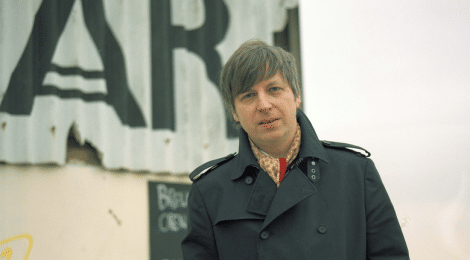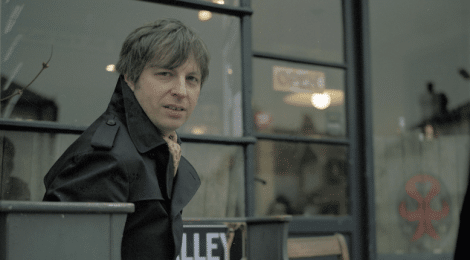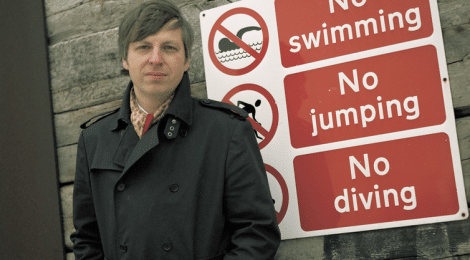
For its 20th anniversary, mica – music austria asked Robert Rotifer (musician, music journalist, radio show host, curator and longtime expert on the Austrian music scene) to share his thoughts on the ‘Future of (Austrian) Music’ in the form of polemical utopias.
MAKING MUSIC FOR A LIVING.
By Robert Rotifer.
A nocturnal taxi ride through Vöcklamarkt, a provincial town in Upper Austria, around the end of the last decade. “You just played in that place?,” the driver asked me and my bandmate, “How much did you get for that?“
“400 Euros,” was my honest answer. Relative to the size of the town and the size of the venue, it seemed like a decent deal. Nowadays you would have to play for a share of door takings, in the unlikely event that the venue was still going.
“My friends and I, we play weddings,” our cab driver explained, unprompted, “and for 400 Euros I wouldn’t even open my guitar case.“
I decided not to tell him that I’d come over from England especially for this and two other Austrian gigs in the hope of selling a few records along the way. You have to maintain a certain level of self-respect. For some of us this means we’d rather play our own songs for less than “Achy Breaky Heart” by Billy Ray Cyrus. And yet, in recent times that wedding band idea has crossed my mind with increasing regularity.
“So, can you make a living from music?” It’s a question that has embarrassed me many a time, mostly asked by people over fifty, not just because people get ruder with age but because they come from a distant age when you could safely assume that someone like me, with seven or eight albums under their belt, clearly had the backing of a record label that saw some economical gain behind it all. That was a logic which anyone could understand, and which emancipated pop musicians, in contrast to their colleagues from the classical world, from the patronage of the cultural establishment and its implied duties of representation. Pop paid for this freedom by forfeiting the privilege of artistic self-legitimisation, but then that had always been something of a mirage anyway. In truth, an avant garde musician was only allowed to make noise or create absolute silence once he/she proven their familiarity with the classical repertoire at an academic level.
In pop, the old elitist virtue of musical training as a license for true artistic expression was replaced by the idea that anything that sells must also be of value. The obvious catch was that before you even got to the point of selling anything you had to rely on the judgment of those whose job it was to assess what they deemed to be marketable. There was no way of proving these people wrong, and as I am writing this piece with the specific situation of Austria in mind, I should explain that in this specific small music market, the circle of those who could make a living from pop music soon merged completely with that of their enablers on the side of the industry. If you wanted to make it, your music had to please the people who held all the strings. I remember well how the main standard of quality we were measured against as aspiring teenage musicians in 1980s Austria was whether or not we sounded “professional”. Only bands whose music achieved a certain degree of predictability would qualify to make a living, as any kind of transgression, anything that threatened to make pop exciting, was considered unprofessional.
You would have thought that punk and a growing independent label culture would have blown all of that away, but not so in Austria where every inkling of (perceived) dilettantism had to be professionalised away immediately. Those who never got to the point where they had any product to offer were identified as hobbyists with no reason to expect financial reward for their weekly trips to the rehearsal room or their gigs in front of their mates.
Essentially, even today our idea of “making a living from music” still goes back to this mindset which informs the perception, especially among musicians, that in the old days musicians used to be able to make a living from music, but not anymore.
At this point I should probably start to whinge about the impossibility of making any money in the digital age. It is a fact, however, that the technological change has not just made the music industry shrink to a mere shadow of its former self, but at the same time, thanks to the means of musical production becoming cheaper all the time, caused a massive explosion of recorded material launched onto an ever-shrinking shrinking market.
Interestingly, Bandcamp, at 15% commission combined with complete pricing freedom probably the fairest popular online DIY sales platform for digital files as well as physical records, boasts of having turned over $73m since its inception, with $2.8m crossing the virtual counter in the last 30 days alone (at the time of writing). What we are not told by bandcamp is the number of artists who took a share in the profits. We do learn, however, that there are currently 1.4m albums available through the site.
On average this means a turnover of $2 a month for every album released, certainly no way to make a living, even if you should have 100 albums going right now. You may have already heard that the crumbs doled out by Spotify are not quite the meal ticket either, even for “major” artists.
The story of the band Vulfpeck that was all over the web in May, but in case you haven’t come across it: It seems Vulfpeck released an album named “Sleepify” to Spotify whose songs consisted of 30 seconds silence each. By constantly streaming their album during the night, fans created a windfall of $20.000 for the band, which then served to finance Vulfpeck’s next tour. In the meantime Spotify have taken the album down because it apparently contravened their terms and conditions. Only because the tracks were silent, though, not because there was anything wrong with getting your fans to stream your album permanently on repeat while they slept.
You can guess that those who are currently running ads on Spotify and other streaming sites might look at the “Sleepify” experiment and ask themselves how much those clicks they are paying for are actually worth.
But let’s leave that to the side for the moment and make the same wrong assumption as many musicians by imagining that the digital revolution had only taken place on the production, not the reproduction side of things. In other words, let’s assume that you would still have to buy records so you could listen to music.
In his book “Das Geschäft mit der Musik”, the German booking agent and author Berthold Seliger demonstrates that, allowing for all expenses involved, an average indie band will make somewhere between 300 and 400 Euros for their first 1000 records sold.
In the USA alone, at the start of this decade, around 77,000 physical albums were released every year. You don’t even need to start counting to know that this market is hopelessly overfed to the point of giving off little more than a hearty, sulphurous burp, with no chance of feeding any meaningful fraction of all those the artists making all those records.
It’s not just that there are too many bands, though. As long as there is software they will also produce far too much music that sounds professional but that nobody actually needs.
You could cut out 99.9 per cent of those 1.4 million albums on bandcamp, and still be left with 1.400 essential ones. More than plenty.
But who should determine, which ones they are?
As all musicians will attest, the music that nobody needs is always the music made by others. While in the old days we missed out on the great works of Bill Fay, John Howard, Damon, Rodriguez or Linda Perhacs, not to mention the unrealised works of all those unfairly judged to be unworthy of a commercial release, these days we are dealing with the consequences of unlimited narcissistic self-fulfilment.
So here is the crucial problem so often overlooked by the jubilant prophets of the digital age: The cheap economy of production is more than offset by an exceedingly tough economy of public attention.
There will always be an element of chance involved, but on the whole the one surefire route to breathing that much-needed oxygen of public attention is to buy it from one bunch of people who make a living from music without making any themselves: PR companies and radio pluggers. In the UK you will need to pay them about £10,000 to get a song major airplay, print and online coverage (although cheaper options for more modest ambitions are available).
Having bought this publicity, you are not only in the position to make your music visible to buyers, but you will also attract the attention of booking agencies that can get you some of the upper slots on the bill at major European festivals. Again, this is a tightly knit clique that also makes a good living from other people’s music.
Just a point to consider next time you read that bands these days just have to “get out there” and make their money from playing live: The lower two thirds or three quarters of any major festival bill is made up of bands that play for free or far less than their costs, while fees in small US, British or German clubs are mostly non-existent or not worth mentioning.
In any case, you will need a sizeable amount of capital to get anywhere near the profitable zone of the live business. Little wonder that the British pop scene nowadays seems populated by the sort of young people from well-to-do backgrounds who used to tell you with a nonchalant smile that they were thinking of going “travelling” for the next year or two.
I admit that I had the privilege myself of enjoying a youth unburdened by financial worries, but if anything this makes me even more aware of the way these things have changed. Having a pop career has become a sort of gap year activity, a kind of more glamorous internship to add to your CV. But why, asks the satisfied customer of cute ukulele songs, would that even matter?
Because pop was always at its most exciting when it represented a counter-narrative to normal society. Pop culture was never an authentic means of expression for the working class, but it was a place where new identities could be forged, and contrary to other, more elitist forms of artistic expression, it was relatively accessible to everyone.
In the early 1960s, a teenage native of a Salford slum called Graham Nash already made more money as a live musician than both his parents put together. And that’s before he even had a record deal. In the 21st century the likes of him have no way of making a living from music except to enter that humiliation machine euphemistically known as the TV talent show.
The way these changes will also change the face of pop culture is already manifest in the here and now, not just in the shape of hundreds of hipster bands with vintage guitars and vintage synths blasting their mournful melodrama about nothing much in particular from festival stages all over the world. You can also see it in those areas where music actually still turns a real profit.
A month or so ago I read a story in the Evening Standard about a guy called Scooter Braun, not in the arts & culture but, tellingly, the business section. Apparently, Braun is a party promoter from New York who recently moved to L.A. and spends a lot of his time managing the careers of people like Justin Bieber, Psy or Ed Sheeran. He also holds shares in Spotify and the taxi app Uber, and in case you’ve been thinking “Why does this guy drone on about the music market when the real money nowadays is in sync deals, films and ads?”, well, that’s exactly the way Scooter Braun sees things too. So he told the Evening Standard about how he hung out with Ed Sheeran discussing how little of his revenue stream comes from traditional sources like record and download sales these days, compared to ads and film and TV rights, where the youthful mawkishness Ed trades in is a top currency, while the Justin Bieber brand seems to be better suited for selling scents to adolescents. Anyway, Ed’s mentor and friend Scooter has already gone another step ahead, having set up a joint venture called The Creative Studio with the ad agency Bartle Bogle Hegarty.
Turns out the ad industry is no longer happy just buying or renting intellectual property for its products, it wants to produce it and own it as well. Only then will the whole package finally be in one and the same hand, from discovering the artist to producing them, from making the ad to making the video, from PR, media work and marketing all the way to cashing in on film and TV rights. His biggest fear, Scooter Braun is quoted, is to wake up one morning not being able to make any “cool shit”.
It seems logical: By origin and function, the sort of ad-friendly cool shit his company produces can never ever be the new punk nor the new Bowie. There is no room for transgression in this business model.
So the way people can or can’t make a living from music turns out to be a deeply political matter.
And that’s before we have even touched the subject of public subsidies that is such a hot potato in Austria. But then this piece was meant to be about making a living from music, not about how to make a living from knowing how to fill in forms and apply for grants, an art in itself that implies no less contradiction and compromise than getting your funding from the ad industry. These too, in the end, are all political matters.
I still remember a time about five or six years ago, before the sale of music-related merchandise had reached saturation point, when people kept saying that you should sell T-shirts instead of records. I started to look around for T-shirts that had been produced for fair wages and under fair working conditions.
I found some. But when I looked at the price the margin wasn’t wide enough at all to guarantee a profit, let alone make up for the shortfall in selling records.
It reminded me of a report I wrote in the early 1990s, visiting Austrian textile factories where the female workforce was under pressure to work for less than the unemployment benefit they would have been entitled to, trying to fend off competition from Eastern Europe. Of course, none of those factories have survived.
My point is: Musicians are not the first to arrive at this point where their work no longer pays to make a living. Many other professions have been here before. And this is where, I’m afraid, I have reached the end of my brief. You can find further input in the debate about a universal minimum income. Or you can go and read Thomas Piketty.
Text: Robert Rotifer
Cover photo: © Elisabeth Voglsam
Article photos: © Anne Meurer
Links:




